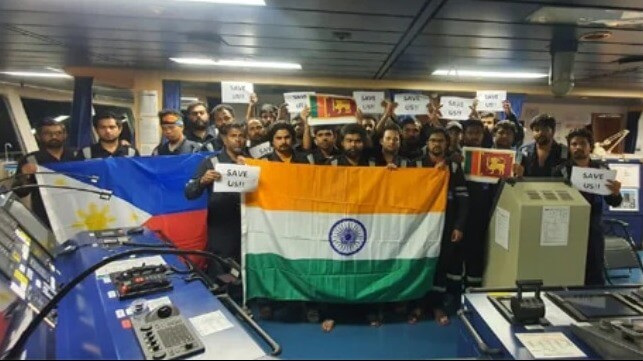Nigerian Navy Uses Antipiracy Law to Charge Crew of the Heroic Idun

The Nigerian government has deployed its recently-enacted antipiracy law to prosecute the crew of a foreign-flagged VLCC, the Heroic Idun. The navy has charged everyone aboard the tanker with the crime of "false pretense to be victims of a maritime offense," among other charges under the Suppression of Piracy and Other Maritime Offences Act 2019 (SPOMO).
The crew of the Heroic Idun have been held in limbo for three months, and with the new charges, it looks like their ordeal is far from over. On August 8, the tanker had arrived to take on a cargo from the Akpo offshore terminal loading buoy when it was approached by the Nigerian Navy vessel Gongola. Fearing a pirate attack, Heroic Idun departed Nigerian waters and reported an attempted act of piracy to the IMB's reporting center.
However, the Idun had not escaped. Alleging that the tanker was attempting to engage in oil theft, Nigeria asked Equatorial Guinea to intercept the Idun and detain it at an anchorage. Guinean authorities held the Idun and her crew until November 11, when the Nigerian Navy took custody of the vessel and ordered the crew to transit to the Bonny terminal in Nigerian waters.
In an arraignment Monday at Port Harcourt, Nigeria, prosecutors charged 16 members of the Heroic Idun's crew with conspiracy to commit a maritime offense; false pretense to be victims of a maritime offense; and "attempting to deal with crude oil within the Nigeria Exclusive Economic Zone without lawful authority." The last charge carries a sentence of life in prison, plus forfeiture of the vessel involved. The remaining 10 crewmembers faced similar charges and were due for arraignment Tuesday.
The workers aboard the Nigerian-owned Akpo platform - without whom there could be no oil transfer to the tanker, legal or otherwise - face no accusations from the Nigerian Navy. Likewise, the oilfield's operating owner, Chinese state-owned oil company CNOOC, has not been accused of any wrongdoing.
Antipiracy aspirations
When enacted in 2019, the SPOMO Act was hailed as a breakthrough in the battle against Gulf of Guinea piracy. At the time, Nigerian pirates operating out of the Niger River Delta were the scourge of the region's shipping sector, and their boardings and kidnappings accounted for the overwhelming majority of serious maritime piracy worldwide. Before 2019, these crimes fell into a legal gray zone in Nigeria, and they were rarely if ever prosecuted.

that matters most
Get the latest maritime news delivered to your inbox daily.
However, the new statute has been deployed just as often against employees of foreign companies as it has against regional pirates. The first convictions under the law were achieved in a case against nine contractors from a UK-based maritime security firm, who were charged with conspiring to abduct seafarers off Equatorial Guinea. (Their lawyer said that the contractors had been hired to deliver a ransom, not to abduct seafarers.)
The second set of convictions under the new law secured 12-year sentences for 10 pirates who attacked the Chinese fishing trawler Hailufeng 11 off Equatorial Guinea in 2020. The case was applauded by the international community as a major step forward in the fight against Nigerian piracy. These convictions - and a bolstering of security efforts in Nigerian waters - appears to have had the desired effect, and serious pirate attacks have virtually disappeared from the Gulf of Guinea since last year.
